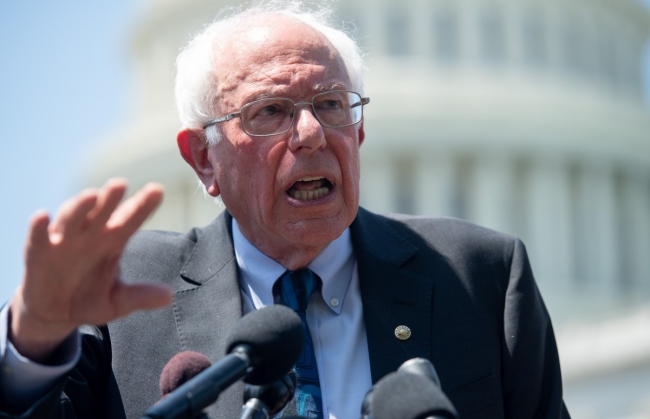You have /5 articles left.
Sign up for a free account or log in.

Senator Bernie Sanders announces his debt plan Monday.
Getty Images
Senator Bernie Sanders, a contender for the 2020 Democratic nomination, on Monday released his plan to address growing student debt -- universal cancellation of all debt regardless of circumstance. The Vermont Independent's announcement comes as debt cancellation is growing in popularity among Democrats.
Sanders's plan extends on a proposal introduced by Senator Elizabeth Warren, the Massachusetts Democrat and fellow candidate for the nomination. Warren's plan would offer $50,000 in loan forgiveness for anyone making less than $100,000 a year, offer tiered loan forgiveness to those making more than that and offer no forgiveness to those making more than $250,000 a year. However, the Sanders plan simply promises to cancel all $1.6 trillion of the existing student loan debt regardless of income class.
Both candidates have pledged in their respective higher-education plans to make two-year and four-year public college tuition free, as well as to invest in historically black colleges and other minority-serving institutions. In the previous presidential campaign, Sanders was the first to call for free public college education, a mantle that was taken on by Hillary Clinton after she won the Democratic nomination that year.
Sanders's campaign argues wage increases have not matched the rate which overall tuition rates and the cost of attending college have increased, leaving "racial and class disparities that persist throughout higher education."
Mark Huelsman, associate director of policy and research at Demos, said there were advantages to Sanders's not including a cap on income.
"Sanders's plan is clearly designed to be simply and easily communicated, and stems from a broader political philosophy and view of how we should provide public goods," Huelsman said in an email. "It's a bigger plan in terms of the sheer number of dollars cancelled. But by removing the income cap and the amount of debt that can be cancelled, it opens up debt cancellation to high-income folks rather than just upper-middle class households. It's really important to make sure any policy is designed in a way that doesn't exacerbate wealth inequality, particularly across race."
Huelsman said the plans are relatively the same minus the income cap and the fact Warren's plan would only cancel debt for 75 percent of people. However, he said Sanders's plan would give more to wealthier borrowers and would be "unlikely to narrow the wealth gap."
Warren's plan drew plenty of criticism for likely benefiting wealthier individuals. Don Heller, provost and vice president of academic affairs at the University of San Francisco, said this problem would only be exacerbated with Sanders's universal plan.
"The major concerns I have with this plan are just magnified in comparison to Warren's in that [Sanders] is giving debt relief to those who simply don't need it," Heller said. "They're willing and able to pay back their student loans. You're simply giving a public benefit from taxpayers to people who are from wealthy families who simply don't need it -- it'd be like giving food stamps to Donald Trump's family."
Tamara Hiler, deputy director of education at Third Way, a centrist Democratic think tank, had similar concerns that the plan may not help those who need it most. She also said it does nothing for the vast number of Americans who don't seek a college degree. However, between the two plans, Hiler said Warren's was "more thoughtful" because it included the income cap.
"We believe that blanket debt forgiveness in general is bad policy that primarily benefits upper middle-class people who attended elite four-year colleges, and does nothing to appeal to the bulk of Americans who don't have a college degree," Hiler said in an email. "Limited funds should be spent on policies that will better target limited resources towards policies that help equip Americans with skills they need to earn a good life, not ones that shovel more tax dollars only to the degree holders who are already doing well in this changing economy."
Both plans face opposition for including graduate loans in their packages of debt relief. Sandy Baum, a higher education economist and a senior fellow at the Urban Institute, said very few people had as much as $50,000 in debt and those who do are likely to have attended a graduate program and have higher earnings. Baum advised Hillary Clinton during the 2016 campaign.
"Here we're giving more subsidies to people who went to college or graduate school and who have higher incomes, not everyone," Baum said. "Think what you could do with K-12 education in this country with this money."
Baum called Sanders's plan "more extreme." It is unlikely to address the racial wealth gap, she said, and will instead subsidize many individuals who have bachelor's degrees and often graduate degrees who have significantly higher wages and opportunities.
Among the other key distinctions between the Sanders and Warren plans is the fact that Warren's debt forgiveness is focused on federal student loans, and does not place much focus on private student loan debt, leaving open the option for the government to help individuals forgive their private student loans. The universality of Sanders's plan would pledge to assist in forgiving all student debt, even loans from private entities.
"With Sanders's plan, it's not just federal student debt which the government could decide to just cancel. With private student loan debt [Sanders] can't just wave a magic wand and eliminate that debt," Heller said. "The government would have to pay those notes, and that's real cash out the door."
Besides Warren and Sanders, Julián Castro is the only one of the other Democratic candidates to suggest a similar plan. The former Secretary of Housing and Urban Development concurred with Sanders on Warren on free public college, and went further to say he supported universal K-12 education. Castro's debt relief plan, however, is highly targeted and calls for capping student loan payments at zero until a borrower's income exceeds 250 percent of the federal poverty line (roughly $31,225 for a single-person household in 2019).
Qualifying Democrats will debate this week on two separate days, with Warren debating on Wednesday and Sanders on Thursday.







